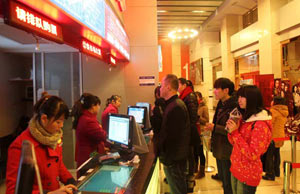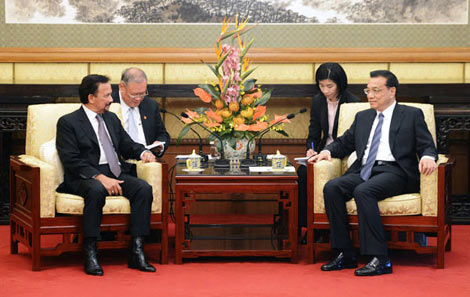
BEIJING - China's fiscal revenue growth slowed sharply in 2012 due to an economic downshift and tax breaks, the Ministry of Finance (MOF) said Tuesday.
National fiscal revenues rose 12.8 percent year on year to 11.7 trillion yuan ($1.9 trillion), with the growth rate dropping 12.2 percentage points from a year earlier, the MOF said in a statement.
The ministry attributed the slowdown to a softening economy, weakening corporate profits, milder inflation and structural tax breaks.
Of the total fiscal revenues, tax revenues reached 10.1 trillion yuan, up 12.1 percent from a year earlier, but the growth rate was down 10.5 percentage points from the 2011 level.
Fiscal revenues in China include taxes, as well as administrative fees and other government income, such as fines and income from state-owned assets.
Revenues from value-added taxes increased 8.9 percent to 2.6 trillion yuan, while those from business taxes went up 15.1 percent to 1.6 trillion yuan.
In breakdown, business tax revenues in the property and construction sector jumped 11.6 percent and 18.6 percent, respectively, while those in the financial industry surged 32.7 percent due to increases in loan interest.
Corporate income tax revenues gained 17.2 percent year on year to 2 trillion yuan. Banks paid 41.9 percent more for income tax, while the income tax revenues of industrial enterprises inched up 2.6 percent, weighed on by slowing profits growth in 2012.
Individual income tax revenues dipped 3.9 percent to 582 billion yuan, affected by the government's move in September 2011 to raise the threshold at which individuals must pay income taxes from 2,000 yuan to 3,500 yuan.
On a quarterly basis, China's fiscal revenue growth recovered to 19.9 percent in the fourth quarter of 2012 from 14.7 percent in the first quarter, 10 percent in the second and 8.1 percent in the third quarter.
The fourth-quarter rebound was mainly caused by a low base in the same period of 2011, the MOF said.
The central government collected 5.6 trillion yuan in fiscal revenues in 2012, up 9.4 percent year on year, while local governments saw fiscal revenues grow 16.2 percent to 6.1 trillion yuan.
Given the slowing economic expansion, sluggish external demand and property sector curbs, local authorities started to lower their fiscal revenue target for 2013.
East China city Hefei set its annual growth for fiscal revenue at 10 percent in the next five years, 14.6 percentage points lower than that of the 2008-2012 period, while Beijing predicted 9-percent growth following the 17.3-percent real annual increase in the past five years.
Liu Shangxi, deputy director of the Research Institute for Fiscal Science under the MOF, forecast that national fiscal revenue growth will slow to a single digit but fiscal expenditure will retain a robust increase in 2013.
The Chinese government will target structural tax reduction and aid for small enterprises to boost the slowing economy, instead of massive stimulus measures, he said.
China's economic growth quickened to 7.9 percent in the fourth quarter of 2012, ending a seven-quarter slowdown after the government cautiously eased its monetary policy and fast-tracked investment projects.
However, impacted by the faltering global economy and a cooling domestic property market, the world's second-largest economy still recorded its slowest annual growth rate since 1999, expanding 7.8 percent in 2012.
The government has vowed to maintain a proactive fiscal policy and prudent monetary policy in 2013.
The country's total fiscal expenditure climbed 15.1 percent year on year to 12.6 trillion yuan in 2012, according to MOF data.
Spending on education recorded the fastest growth, surging 28.3 percent to 2.1 trillion yuan.
The central government spent 6.4 trillion yuan in 2012, including 4.5 trillion yuan in tax rebates and transfer payments given to local governments.
Local governments saw outlays rise 15.3 percent to 10.7 trillion yuan in 2012, the MOF data showed.
 'Cat model' to dazzle Shanghai auto show 2013
'Cat model' to dazzle Shanghai auto show 2013
 Models at Tokyo modified car show
Models at Tokyo modified car show
 Shanghai Fashion Week focuses on domestic brands
Shanghai Fashion Week focuses on domestic brands
 Angel-dress models at Shandong auto show
Angel-dress models at Shandong auto show
 Safe and Sound
Safe and Sound
 Theater firms scramble for managers
Theater firms scramble for managers
 Premier pledges closer ties with Brunei
Premier pledges closer ties with Brunei
 Volkswagen's all-new GTI at New York auto show
Volkswagen's all-new GTI at New York auto show